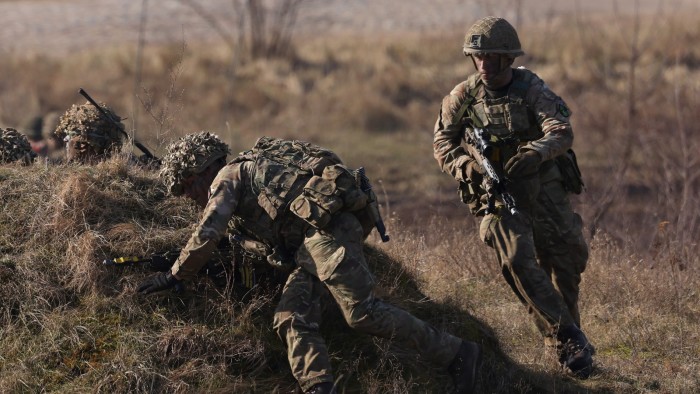Unlock the Editor’s Digest for free
Roula Khalaf, Editor of the FT, selects her favourite stories in this weekly newsletter.
EU governments are exploring ways to include the UK and Norway in a “coalition of the willing” dedicated to expanding the continent’s defences, while circumventing militarily neutral and Russia-friendly capitals.
UK Prime Minister Keir Starmer and Nato secretary-general Mark Rutte will join EU leaders in Brussels on Monday to deliberate how to share the vast costs of rearmament and of increasing military capabilities. The discussion behind closed doors is taking place as the continent is under increasing pressure to take more responsibility for its own security.
Russia’s war against Ukraine and US President Donald Trump’s demands for European countries to raise defence spending drastically have prompted feverish and often divergent discussions on the future of the continent’s military capabilities and how to finance a funding gap estimated by the European Commission to be in excess of €500bn.
The leaders will come under greater pressure to find common ground after Trump threatened to impose tariffs on EU goods, following sweeping trade measures against China, Mexico and Canada announced this weekend.
Some leaders have proposed increasing already large purchases of US weapons to appease the White House on two fronts while also improving their defences. Others are worried that an economy-sapping trade war will only reduce their ability to spend more on arms.
“Short-term, we must show unity on this issue of increasing our defence capacities,” said one senior EU diplomat involved in the pre-summit discussions. “But it’s clear that on the medium and long-term horizon, there will probably be another way forward that is led by a more dedicated group.”
The debate has exposed divisions between the EU’s biggest defence players, Germany and France, neutral states such as Austria and Ireland, and the pro-Russian stance of Hungary and Slovakia. High defence spenders such as Poland and the Baltic states meanwhile are pitted against laggards such as Italy and Spain.

Financing is a key reason to diverge from a purely EU approach to a broader European “coalition of the willing” with Nato members such as the UK and Norway, officials said. Such a structure has already been proposed for a collective plan involving the European Investment Bank to raise bonds for defence purposes.
“We can’t talk about security on the European continent without Nato, without the Brits,” said another EU diplomat, who added that discussions were still to be had on “which [defence] capabilities should be common and which capabilities are the individual responsibility of member states”.
Starmer met German chancellor Olaf Scholz at his Chequers residence on Sunday ahead of the summit, where they agreed on “the importance of scaling up and co-ordinating defence production across Europe”, according to a readout of the meeting.
A German government official said the Monday summit would include discussions on the financing of Europe’s defence industry, including by “strengthening and deepening partnerships” with non-EU countries.
Norway is acutely aware of its need for good relations with the EU in the case that Trump starts a trade war with the bloc. As it is only part of the European Economic Area, Norway risks being subject to levies from both the US and the EU. “We got an exemption from the EU’s tariffs last time, but it’s not a given,” said a Norwegian official.
The “coalition of the willing” would allow circumventing four EU neutral states that are not members of Nato — Austria, Cyprus, Ireland and Malta — and the pro-Russian leaders of Hungary and Slovakia.
Monday’s summit was designed by European Council president António Costa to be as informal as possible, with no joint statement planned. But the discussion will guide the commission in crafting a proposal due in spring on ways to increase joint weapons procurement and better co-ordinate the bloc’s defence industry.
EU officials said the intention of the summit was to find “unity” on the broad issue of upgrading the continent’s defence capacities. But they admitted that finding consensus would be difficult among all 27 members.
“It will not be easy to find the overlaps between all member states,” said a second EU official involved in preparing the summit. “There is all this diversity [on defence].”
Nineteen EU member states signed a joint letter this week calling for the EIB, the world’s largest lender with a balance sheet of about €550bn, to relax its rules currently prohibiting direct funding of defence projects.
Some capitals are also pushing for the EU to dilute its rules on debt and deficit levels to exclude defence spending, others want the EU to loosen restrictions on using its shared budget for military purposes, while Germany and the Netherlands oppose any additional EU joint borrowing for defence.
“They will have to come up with some sort of creative programming,” said another EU official involved in the preparations. “Everyone wants to have more money for defence and security.”







